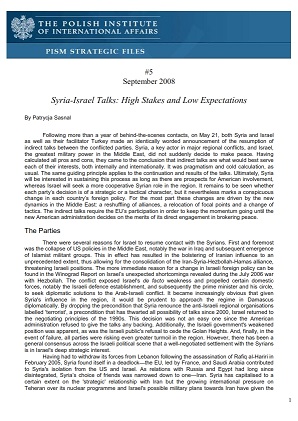№5: Syria-Israel Talks: High Stakes and Low Expectations
№5: Syria-Israel Talks: High Stakes and Low Expectations
Author(s): Patrycja Sasnal
Subject(s): Governance, International relations/trade, Security and defense, Geopolitics, Peace and Conflict Studies
Published by: PISM Polski Instytut Spraw Międzynarodowych
Keywords: Syria; Israel; Turkey; conflict; Middle East; international relations; geopolitics; foreign policy;
Summary/Abstract: Following more than a year of behind-the-scenes contacts, on May 21, both Syria and Israel as well as their facilitator Turkey made an identically worded announcement of the resumption of indirect talks between the conflicted parties. Syria, a key actor in major regional conflicts, and Israel, the greatest military power in the Middle East, did not suddenly decide to make peace. Having calculated all pros and cons, they came to the conclusion that indirect talks are what would best serve each of their interests, both internally and internationally. It was pragmatism and cold calculation, as usual. The same guiding principle applies to the continuation and results of the talks. Ultimately, Syria will be interested in sustaining this process as long as there are prospects for American involvement, whereas Israel will seek a more cooperative Syrian role in the region. It remains to be seen whether each party’s decision is of a strategic or a tactical character, but it nevertheless marks a conspicuous change in each country’s foreign policy. For the most part these changes are driven by the new dynamics in the Middle East: a reshuffling of alliances, a relocation of focal points and a change of tactics. The indirect talks require the EU’s participation in order to keep the momentum going until the new American administration decides on the merits of its direct engagement in brokering peace.
Series: PISM Strategic File
- Page Count: 4
- Publication Year: 2008
- Language: English
- Content File-PDF

